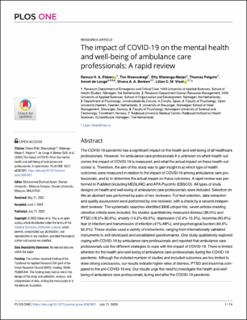| dc.contributor.author | Ebben, Remco H A | |
| dc.contributor.author | Woensdregt, Tim | |
| dc.contributor.author | Wielenga-Meijer, Etty | |
| dc.contributor.author | Pelgrim, Thomas | |
| dc.contributor.author | De Lange, Antoinette Harmke | |
| dc.contributor.author | Berben, Sivera A A | |
| dc.contributor.author | Vloet, Lilian C M | |
| dc.date.accessioned | 2023-11-22T11:38:26Z | |
| dc.date.available | 2023-11-22T11:38:26Z | |
| dc.date.created | 2023-07-25T14:07:02Z | |
| dc.date.issued | 2023 | |
| dc.identifier.citation | Ebben, R. H., Woensdregt, T., Wielenga-Meijer, E., Pelgrim, T., de Lange, A., Berben, S. A., & Vloet, L. C. (2023). The impact of COVID-19 on the mental health and well-being of ambulance care professionals: A rapid review. Plos one, 18(7), e0287821. | en_US |
| dc.identifier.issn | 1932-6203 | |
| dc.identifier.uri | https://hdl.handle.net/11250/3104094 | |
| dc.description.abstract | The COVID-19 pandemic has a significant impact on the health and well-being of all healthcare professionals. However, for ambulance care professionals it is unknown on which health outcomes the impact of COVID-19 is measured, and what the actual impact on these health outcomes is. Therefore, the aim of this study was to gain insight in a) which type of health outcomes were measured in relation to the impact of COVID-19 among ambulance care professionals, and b) to determine the actual impact on these outcomes. A rapid review was performed in PubMed (including MEDLINE) and APA PsycInfo (EBSCO). All types of study designs on health and well-being of ambulance care professionals were included. Selection on title an abstract was performed by pairs of two reviewers. Full text selection, data extraction and quality assessment were performed by one reviewer, with a check by a second independent reviewer. The systematic searches identified 3906 unique hits, seven articles meeting selection criteria were included. Six studies quantitatively measured distress (36,0%) and PTSD (18.5%-30.9%), anxiety (14.2%-65.6%), depression (12.4%-15.3%), insomnia (60.9%), fear of infection and transmission of infection (41%-68%), and psychological burden (49.4%-92.2%). These studies used a variety of instruments, ranging from internationally validated instruments to self-developed and unvalidated questionnaires. One study qualitatively explored coping with COVID-19 by ambulance care professionals and reported that ambulance care professionals use five different strategies to cope with the impact of COVID-19. There is limited attention for the health and well-being of ambulance care professionals during the COVID-19 pandemic. Although the included number of studies and included outcomes are too limited to draw strong conclusions, our results indicate higher rates of distress, PTSD and insomnia compared to the pre-COVID-19 era. Our results urge the need to investigate the health and well-being of ambulance care professionals during and after the COVID-19 pandemic. | en_US |
| dc.language.iso | eng | en_US |
| dc.publisher | PLOS | en_US |
| dc.rights | Navngivelse 4.0 Internasjonal | * |
| dc.rights.uri | http://creativecommons.org/licenses/by/4.0/deed.no | * |
| dc.title | The impact of COVID-19 on the mental health and well-being of ambulance care professionals: A rapid review | en_US |
| dc.type | Peer reviewed | en_US |
| dc.type | Journal article | en_US |
| dc.description.version | publishedVersion | en_US |
| dc.rights.holder | © The Authors | en_US |
| dc.subject.nsi | VDP::Medisinske Fag: 700::Helsefag: 800 | en_US |
| dc.source.pagenumber | 14 | en_US |
| dc.source.volume | 18 | en_US |
| dc.source.journal | PLOS ONE | en_US |
| dc.source.issue | 7 | en_US |
| dc.identifier.doi | 10.1371/journal.pone.0287821 | |
| dc.identifier.cristin | 2163500 | |
| dc.source.articlenumber | e0287821 | en_US |
| cristin.ispublished | true | |
| cristin.fulltext | original | |
| cristin.qualitycode | 1 | |

